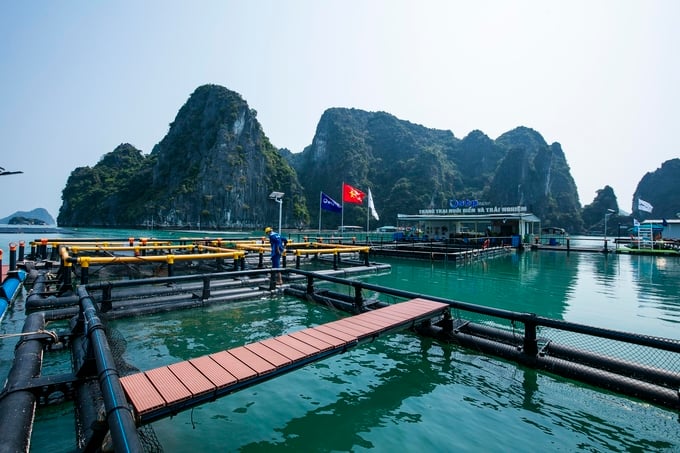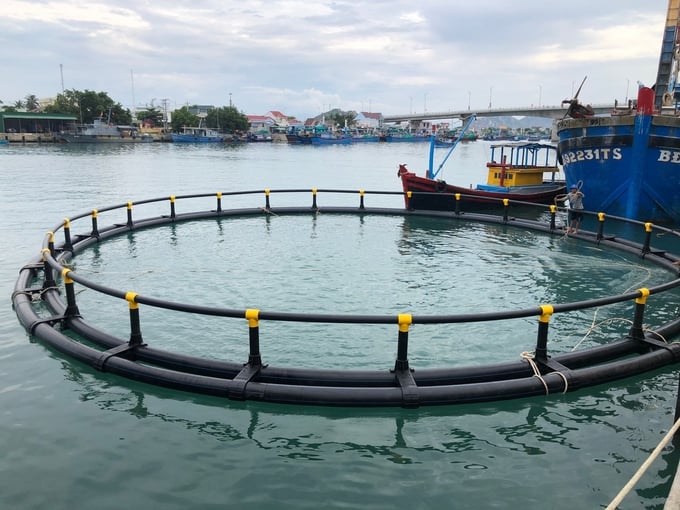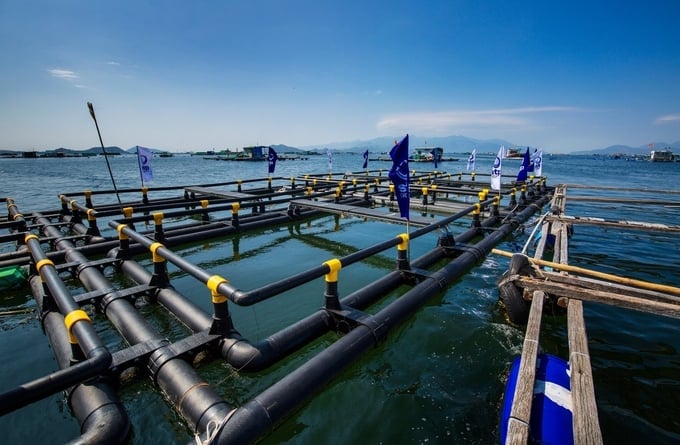November 27, 2025 | 08:20 GMT +7
November 27, 2025 | 08:20 GMT +7
Hotline: 0913.378.918
November 27, 2025 | 08:20 GMT +7
Hotline: 0913.378.918

A mariculture farm in Van Don district, Quang Ninh province with multiple HDPE cages.
In the past, Vietnamese fishermen commonly practiced aquaculture using wooden/bamboo cages supported by foam buoys or plastic cages, which offered the advantage of cost-effectiveness.
However, this model featured several drawbacks including low durability, environmental pollution, low productivity, and a notable lack of resilience to storms.
Recognizing these challenges, STP Group introduced a solution for aquaculture using HDPE cages. This innovative technology marks a recent introduction in aquaculture practices across various provinces and cities.
HDPE, a polymer known for its corrosion resistance and ability to withstand pressure, serves as an environmentally friendly material.
By utilizing HDPE aquaculture cages, fishermen can minimize environmental impact and benefit from increased productivity, reduced costs, and prolonged usage without corrosion concerns.
STP Group introduced three comprehensive support packages aimed at fisherman to enable rapid and convenient access to this modern mariculture technology.
Firstly, under the installment plan package, fishermen are provided with preferential installment payment assistance for a duration of five years. After three to five years, fishermen will be granted ownership of these assets.
This support package allows fishermen to split the payment into smaller installments on a monthly/quarterly basis, thereby alleviating financial burdens.

HDPE round mariculture cages enable fishermen to increase productivity and reduce costs.
Notably, fishermen are not required to pledge collateral to own HDPE aquaculture cages, which allow them to focus on improving production.
With installment packages, fishermen will receive a 50% reduction in initial investment costs for infrastructure, construction, installation, maintenance per quarter per year; and complimentary products such as nets, anchors and so on.
Secondly, under the full investment cost support package, despite the high initial costs, STP Group will support fishermen with up to 30% of the costs to transition from a traditional wooden cage system to modern HDPE aquaculture cages.
Additionally, fishermen will receive installation instructions from experts; high-tech aquaculture equipment minimizes risks in the farming process; connections with reputable seeds and feed suppliers, as well as participation in an ecosystem chain allow fishermen to enhance the value of their output products.

STP Group also offers square cages suitable for various mariculture models.
Thirdly, under the leasing package, fishermen have the option to lease HDPE cages for a small monthly fee and pay quarterly/yearly, with payments made on a quarterly/yearly basis, as an alternative to committing to a substantial upfront investment.
In addition to rental fees, STP Group provides free transportation, installation, maintenance, and quarterly/yearly servicing.
Furthermore, fishermen have the opportunity to participate in STP Group's integrated ecosystem, and receive support from cooperatives, seed suppliers, and regional institutes throughout the production process.
With this support package, fishermen are required to invest a minimal upfront amount, followed by affordable monthly payments.
Fishermen can save on labor resources and minimize repair expenses compared to traditional cage systems made of wooden rafts and plastic barrels.
Notably, STP Group will transfer the ownership of leased products to fishermen after five years.
Fishermen collaborating with STP Group under any of these three packages will receive support in purchasing high-quality seedlings at preferential prices. They will also receive free expert consultation on resolving challenges during the production process, and quarterly/yearly maintenance services. The company will support product distribution at competitive market prices.
Translated by Nguyen Hai Long

(VAN) Le Hoai Trung, Member of the Communist Party of Vietnam Central Committee and Minister of Foreign Affairs, held talks with Vi Thao, Chairman of the Guangxi Zhuang Autonomous Region (China) this week.

(VAN) The Mekong River Commission adopts the 2026 - 2030 Strategic Plan with a people-centered approach.
/2025/11/26/1720-1-200855_132.jpg)
(VAN) Viet Nam and Japan have many conditions to expand cooperation on climate change adaptation, particularly in disaster risk management based on advanced technologies.

(VAN) The strong development of digital technology and artificial intelligence is opening up opportunities to transform science and technology into a 'Magic eye' for disaster forecasting and early warning.

Applying vaccines and proactive disease prevention helps pig herds stay healthy, maintain productivity, reduce risks, and decrease reliance on antibiotics in modern livestock farming.

(VAN) Many advanced agricultural technologies and products were shared at the Viet Nam - South Korea Agricultural Technology Introduction, Trade Promotion, and Connection Seminar 2025.

(VAN) Minister Tran Duc Thang hopes to strengthen connections and exchanges with China in agriculture and environment sector through the Embassy of Vietnam in Beijing.